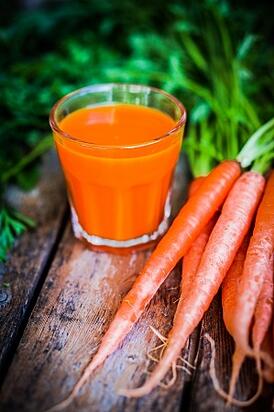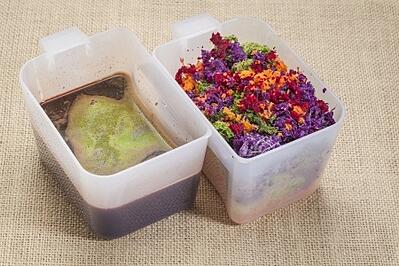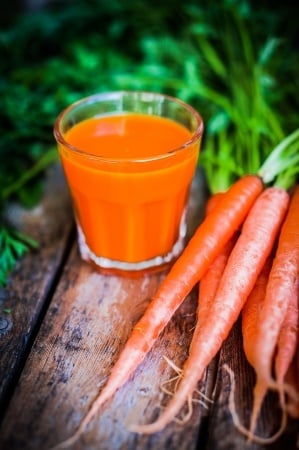You hear a lot about the health benefits of juicing these days in the news— but does it really live up to the hype? Let's see how it stacks up next to whole fruits and vegetables...

Juicing isn't necessarily an unhealthy option, but when compared to the whole food, it is nutritionally inferior. In fact, similar to choosing refined grains over whole grains, choosing juices over the whole fruit or vegetable means you're missing out.
If you’ve read any of my blog posts, you probably know that I am a fan of a whole foods diet. Although this is the case, I do understand that some foods (such as avocados or bananas) have inedible parts that need to be removed.
The difference with juicing is that it doesn’t only remove the inedible parts of the produce. It also removes major parts of the fruits and vegetables, and in doing so loses their fiber. The fiber is of particular importance because it not only promotes gastrointestinal health, but also helps you maintain a feeling of being full. By the time you're done juicing your fruits and vegetables, what you are left with is sugars, water, some antioxidants, vitamins and minerals. The lack of fiber in the juice can lead to spikes in blood sugar and increased appetite. The process of juicing itself also does a lot of the "digesting" for you. This means your body has less work to do to break down the food.
 As a whole food, the fruit or vegetable could potentially take longer to break down in the body and also may use up more calories to digest. In turn this could satisfy hunger for longer periods of time. This may also help to better control blood sugars.
As a whole food, the fruit or vegetable could potentially take longer to break down in the body and also may use up more calories to digest. In turn this could satisfy hunger for longer periods of time. This may also help to better control blood sugars.
A study in the Journal of the American Dietetic Association1 suggested that eating whole foods as opposed to refined foods can significantly increase thermogenesis (the energy it takes to metabolize food) and thus burn about 50% more calories compared to when you consume refined foods. This makes sense as the whole food requires more work to break it down when compared to refined foods because the whole food maintains a higher nutrient density. (You probably didn’t consider your juicing regimen to be a “refined food diet,” did you?)
5 Nutritional Takeaways on Juicing Versus Whole Foods:
All in all, you are better off nutritionally when you choose to eat whole rather than processed…besides, think of all the time you can save not having to clean out your juicer!
If you're looking to juice so you can improve your health and jumpstart your diet, a healthier alternative is to blend your fruits and vegetables with some water or tea. Blending them doesn't remove any of the beneficial parts of the fruit or vegetable. Be sure to include some dark leafy greens and antioxidant-rich berries (try them frozen!). You may even want to mix in some chia, flax, or hemp seeds.
Learn more about the nutritional benefits of whole foods in our recently-updated Guide to Whole Grains:

If you liked this post, you may also enjoy:
- Why is Fiber Good for You? 4 Reason to Eat More Whole Foods
- Order Up a Healthy Coffee Drink This Fall With Our Tips
- Whole Grain Breads are Full of Nutrition, Not Marketing
- Mediterranean Diet Offers Easy Path to Health for Food Lovers
References:
1 Barr S, Wright J. Postprandial energy expenditure in whole-food and processed-food meals: implications for daily energy expenditure. J Am Diet Assoc. 2011; 111:9:A 15. Full article available here.




